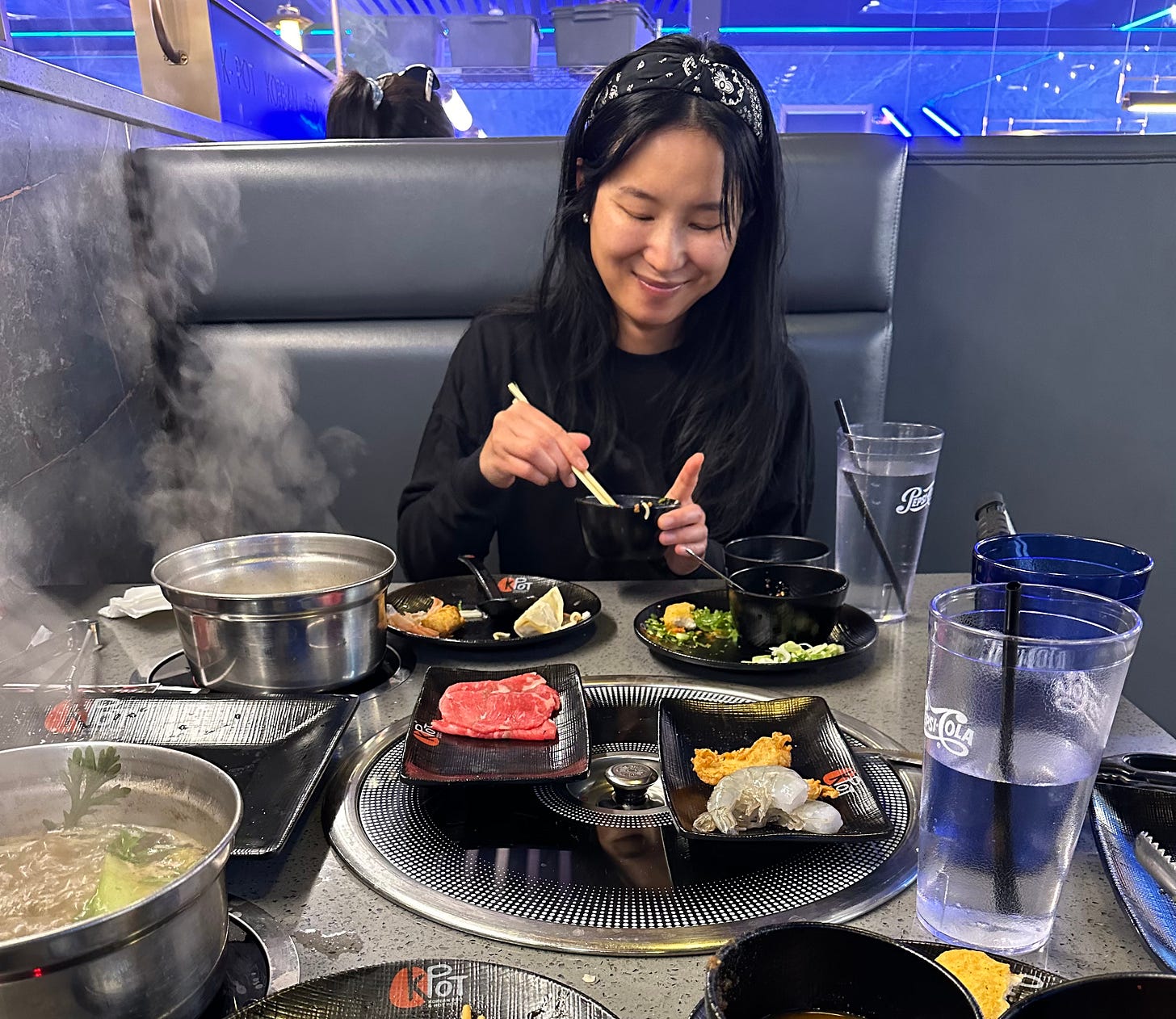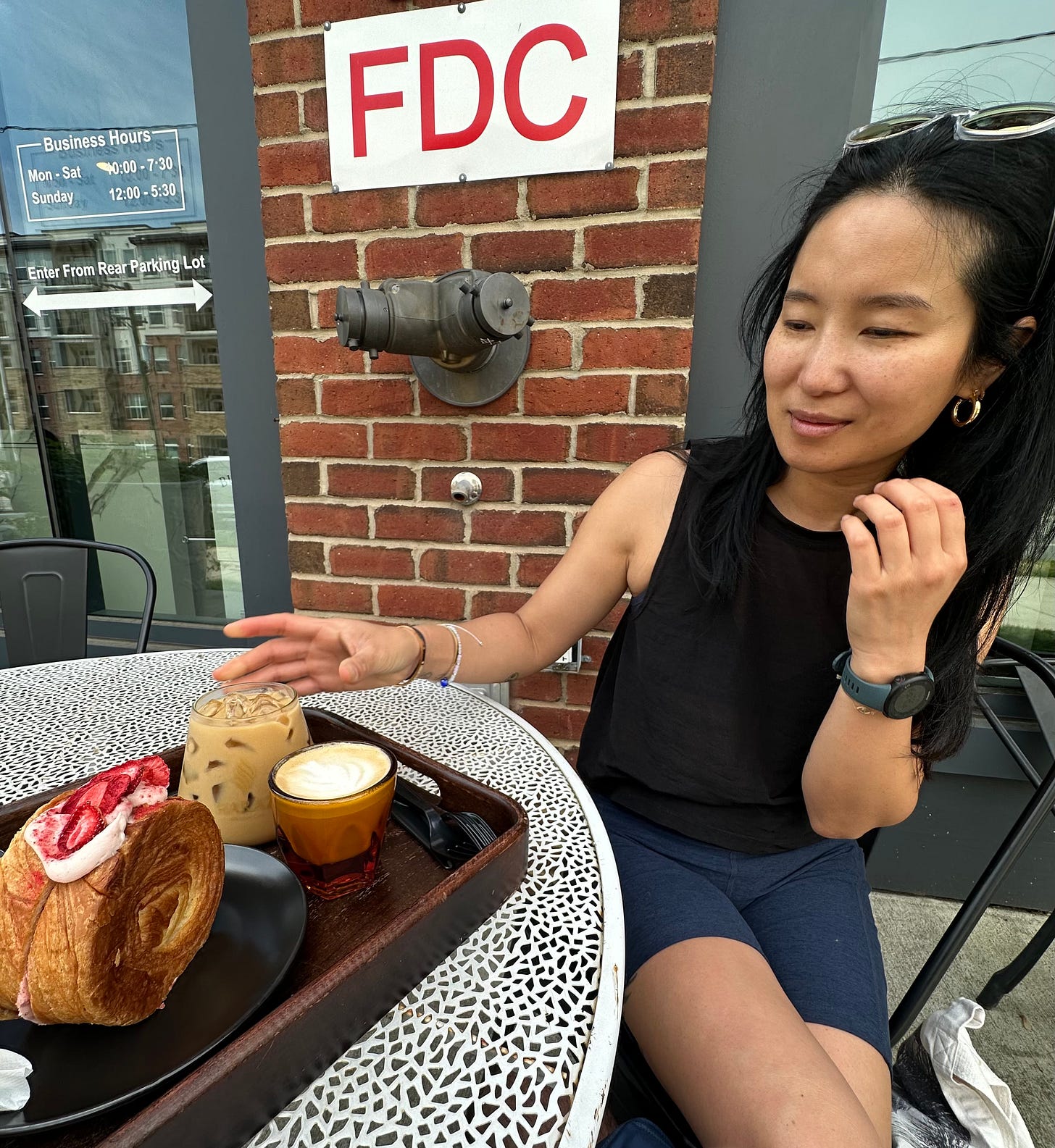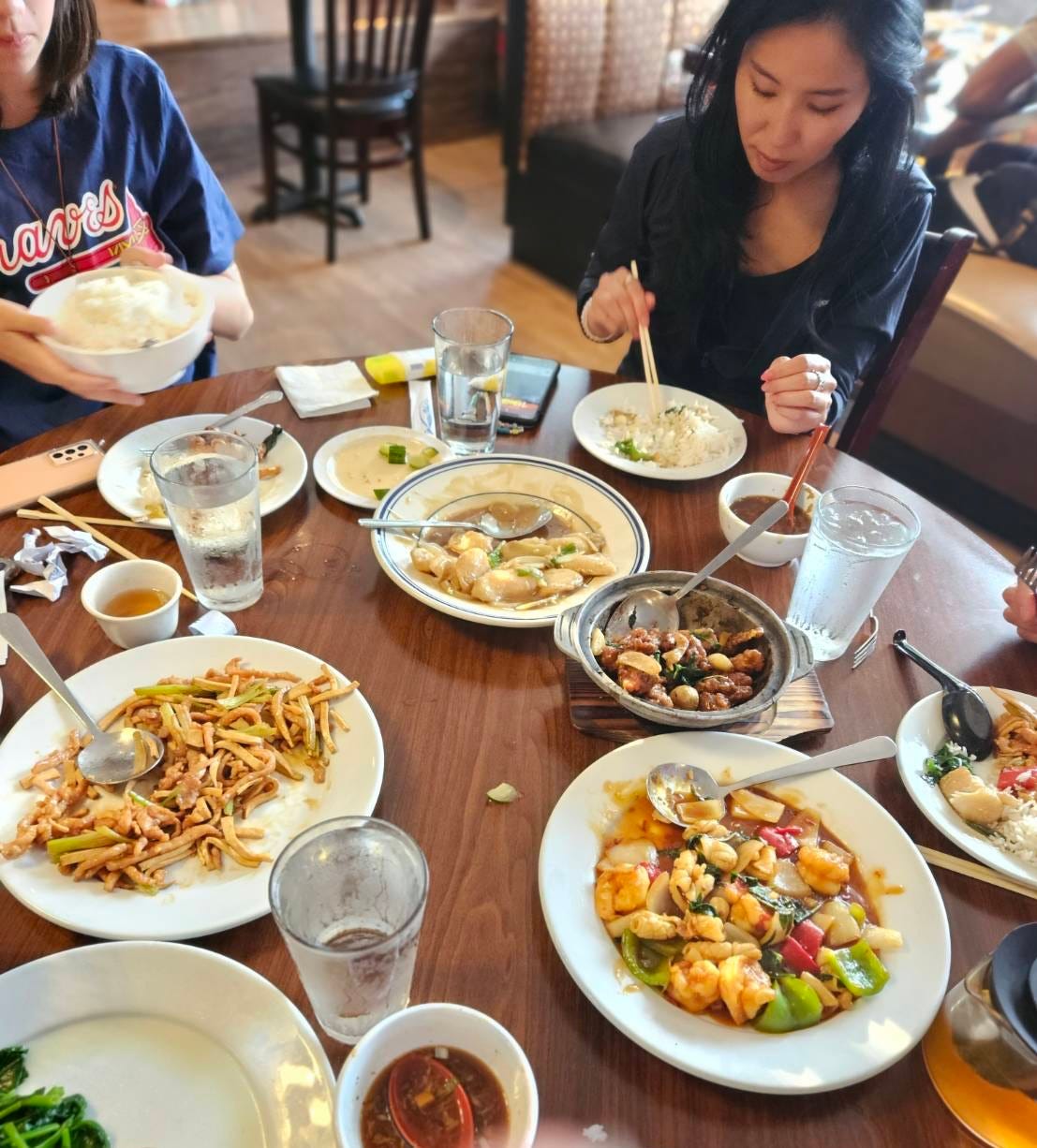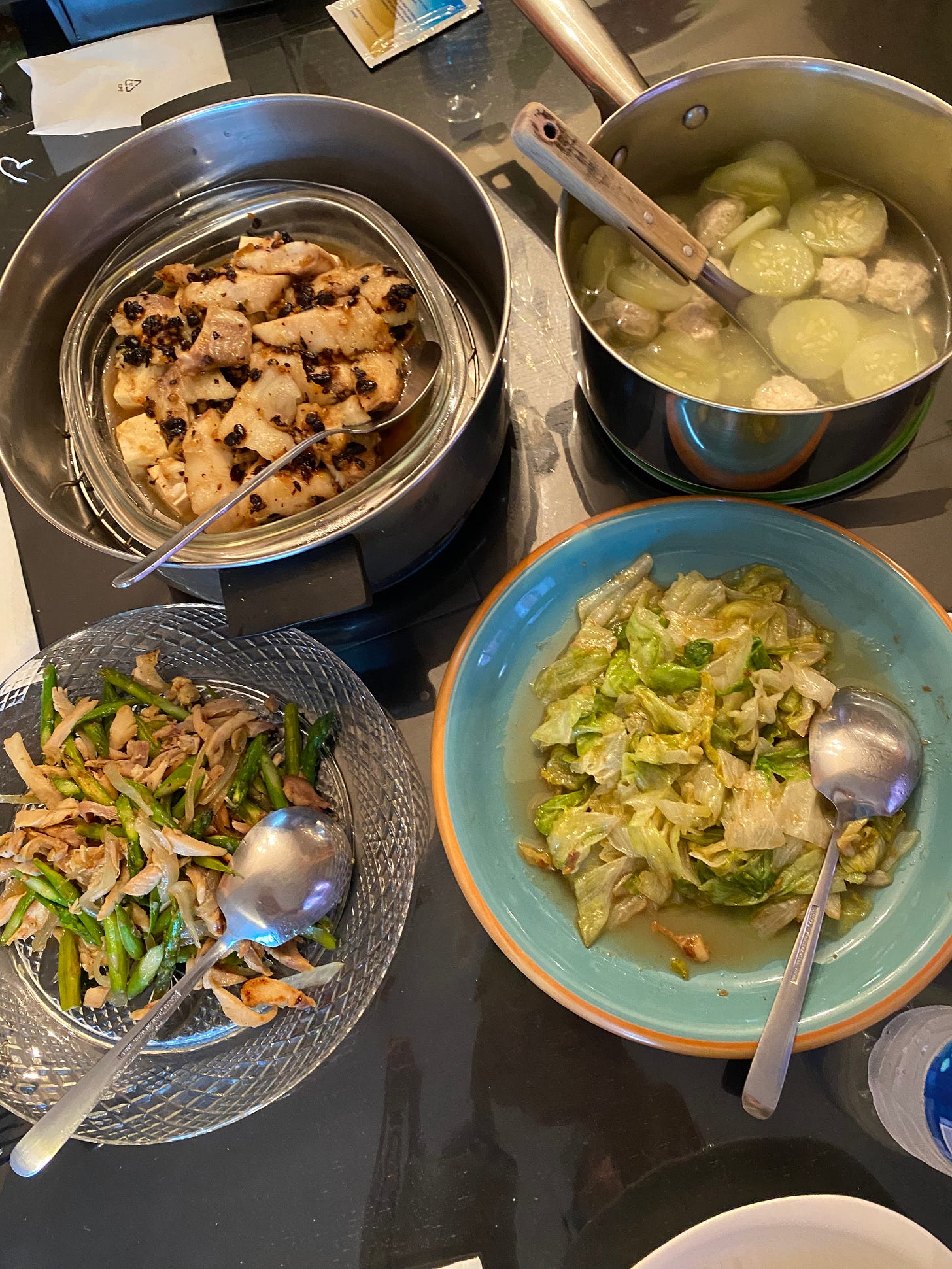Rituals: How I try to eat healthy and fight sugar addiction
My supplements, diet and smoothie tips, and cheat day guilty pleasures
I watched this Instagram Reel this past week.
Here’s a similar Tiktok:

 Tiktok failed to load.
Tiktok failed to load.Enable 3rd party cookies or use another browser
My first reaction was, I guess, “appalled.”
In short, there’s a heavyset woman packing a lunch for her husband.
It contains mostly processed foods, junk foods for snacks, and even sugary, hyper-caffeinated beverages. She calls herself a “Lower middle class wife.”
The comment section is pretty unkind, with judgment across the board from Europeans and Americans alike—incredulous at how all of this constitutes as food in the U.S., how she’s uneducated, how she’s the reason our collective medical premiums will continue to go up, and so on.
Dig a little deeper and you see the creator is also a mother of 7.
And then you see her husband, who appears big and tall in stature.
Frankly, I don’t know how this made my feed, but it got me thinking about what food options are available when you’ve got a big (literally and actually) family to feed on a limited budget.
But then, there’s also the constraints of your location and education, e.g., how much you’ve been exposed to, and how much you’ve learned or care about what you put in your body.
In conversation, I’m not one of those people who offers up their fitness and diet routines unless first asked.
Content entrepreneur | Agency Founder & CEO | Bestselling author Featured in Forbes, Wall Street Journal, Business Insider, Bankrate, Cheddar TV, HuffPost | Join more than 3,700 people who follow Shindy’s unconventional lifestyle, travel, and career advice:
I’ve written about my fitness Rituals, but not my food choices, which I believe skew on the “aware” or healthier side.
I wouldn’t dare tell anyone what they should or shouldn’t be doing—this is just what works for me.
My daily coffee Ritual isn’t changing any time soon.
I don’t drink alcohol. Well, maybe an occasional glass of exceptional red wine to go with a delicious steak.
I lean toward an attitude where physical health and ailments are largely a result of what goes into your body; a lot of western approaches tend to focus more on treating surface symptoms instead of targeting the gut, physical activity, and dental health.
Even so, I succumb to and struggle with sugar addiction.
While I don't take sugar in my tea or coffee and avoid sweetened yogurt, and artificially sweetened foods, my temptations are mostly of the baked goods variety, specifically pastries, donuts, and cookies.
The more beautifully decorated or unique, the more of a sucker I am for that dopamine hit.
When I lived in Paris, one day a girlfriend and I actually went on an unintentional pâtisserie and boulangerie tour.
When we saw something we wanted, we got it. When in Rome (er, Paris)!
But as I’ve gotten older and my metabolism has slowed down, I’ve learned more about sugar’s damaging effects on my body, so I’m trying my best to reduce my sugar intake.
It’s a daily effort (struggle?).
I know I can’t be alone, so here are my general food Rituals and tips, in no particular order:
Grocery shopping: More perimeter, less aisles
I'm lucky that I have loads of grocery options around me, in the form of health-focused chains like Whole Foods and Sprouts, and chains that offer organic options like Publix, Harris Teeter, Trader Joe’s, and even Food Lion.
I’m particularly lucky to have Asian grocery stores like G-Mart/H-Mart and even Japanese groceries that offer huge produce and greens sections.
I love sautéing leafy greens and ginger: so simple, so satisfying.
In general, if you shop the perimeter of a grocery store, then that’s where all the freshest items are located and restocked regularly.
Packaged and processed foods with a longer shelf like snacks, chips, crackers, and popcorn tend to reside within the isles.
Organic when possible
Several years ago, my niece informed me that her class was reading “The Omnivore’s Dilemma,” by Michael Pollan.
She announced proudly that “organic foods are a scam.” So cute.
Well, it’s more like the book asserts that organic labels are a marketing tool; I don’t disagree to an extent, but you can also be concerned about certain farming methods or chemicals.
By now I think most fruits or vegetables have been genetically modified in some way, and my general rule of thumb is: if I’m eating the entire fruit, say the whole blueberry, skins and all—then I’ll opt for organic.
If the fruit is inside a skin or peel, like a banana, then non-organic is okay.
Other things that go in my shopping cart are non-dairy creamers like this coconut milk-based unsweetened one by Laird Superfood, greens, coconut or kefir yogurts, and proteins. Speaking of proteins…
More protein than carbs
In Asian cuisine, it's difficult to avoid white carbs like white rice and noodles. Luckily, there is an abundance of protein and veggie options.
I make a concerted effort to eat a ratio of 3 to 1, favoring protein and vegetables over rice and noodles.
This keeps my mother happy about because I can continue to eat her delicious cooking with rice, because sometimes, you just need rice.
On protein, I favor grass fed red meats and organic chicken. For seafood, wild-caught salmon.
I used to love tofu as a protein source, but have eliminated it from my diet because of its high soy and complex sugar content, and because of its estrogen-like effects in the body, like bloating.
A cheat day here and there
Giving anything up cold turkey is hard and will likely resort to relapse.
Even Tim Ferriss says to give yourself cheat days where anything goes—pizza, ice cream, the works.
So, I try to dog-ear certain foods to try only on designated days.
Less deprivation, more discipline.
Supplements
My supplement roster looks like this. Not daily, more like 2 to 3 times weekly:
BoneUp for bone density health
HairBurst or for collagen, biotin, and and hair and nails support
ZMA (zinc, magnesium) at night for better quality sleep
Less frequent supplements:
Elderberry or vitex berry for hormonal regulation
Elysium Matter for brain health
Smoothies
My favorite smoothie is the Blue Majik smoothie from Sun Life Organics, and also the Deep Blue from OM Juice Bar in New York (with a few mods, like no pineapple juice for less sugar).
I've tried to recreate a version of these smoothies at home, with the following ingredients:
Grass-fed whey protein
Bananas
Blueberries
Malt oat milk or Ripple pea milk
Ground flax seeds
Blue spirulina
[blend together with ice]
Occasionally I’ll add some MCT-oil powder or even mushroom powder.
Foods I avoid for a happy gut
I discovered my sensitivity to high-FODMAP foods when I attended a 2017 yoga retreat at Kripalu, in upstate New York.
It’s all inclusive so you are limited to that day’s cafeteria options, which were admittedly diverse, healthy, and delicious.
However, after downing a bowl of mulligatawny soup, where the primary ingredient is lentils, I was up most of the night—I’ll spare you the details.
I, like many IBS-sufferers, avoid foods high in FODMAPs like brussels sprouts, cauliflower, and chickpeas.
Unfortunately these delicious foods result in a lot of discomfort, bloating, and stomach pain for me.
Lastly, I also try things like eating my last meal of the day before 7:30 p.m. and also easy intermittent fasting.
There are plenty of resources on the benefits which I won’t get into, but my sleep metrics have shown that I sleep and feel better as a result of doing so.
What are your food and diet rituals?
Am I missing out on something delicious and if so, reply or share in comments!
P.S. Here are useful resources about foods, chemicals, allergies, sugar, and inflammation:
This Is Your Mind On Plants, Michael Pollan
Why do we as a culture so readily accept caffeine and alcohol, but not opium or mescaline?Genius Foods, Max Lugavere
The top foods for better brain health: dark chocolate, blueberries, and olive oil are on the listPlant Paradox, Dr. Steven R. Gundry
Why lectins may be the root of your inflammation, with food lists (opt for white vs. brown rice, walnuts and pecans vs. cashews)The Truth About Sugar Addiction, Minesh Katri, MD
Huberman Lab ft. Dr. Robert Lustig: How Sugar & Processed Foods Impact Your Health
**
Until next time,
Shindy
On Instagram + TikTok
***
Like it
Did you enjoy this newsletter?
Please like it by clicking on the ❤️ at the very top or bottom of this post. This really helps get this newsletter recommended to SubStack’s recommended shortlists.
Referral Rewards
When you share my newsletter with someone you think would find value in it, that is the greatest gift. 🙏
Rituals is a section where on the first Friday of every month, I’ll cover a regular daily, weekly, or monthly personal habit. It may be a lifestyle, wellness, or work practice that has become a valuable and beneficial part of my life. Enjoy!












Ron just read this and said that you’re an amazing writer! We already know that! He loved your context and wishes we had a Sprouts in Virginia Beach. ❤️❤️❤️❤️❤️❤️
Ron is going to love this article!!!